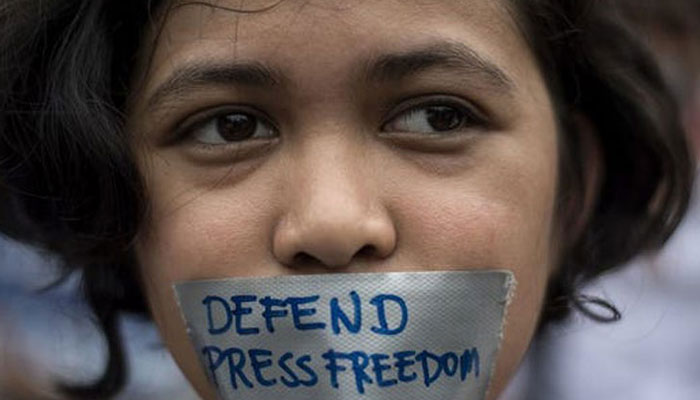Protecting or silencing?
Punjab government has proposed a new anti-defamation law: the Punjab Defamation Bill 2024
One would expect those that have endured persecution would try and undo the work of those who lacked the democratic legitimacy they have. However, the Punjab government now appears to be building on a legacy they ought to be doing away with. Having decided that the 2002 Defamation Ordinance is not enough, the Punjab government has proposed a new anti-defamation law: the Punjab Defamation Bill 2024. The Punjab information minister has claimed the law will only go after those spreading lies under the guise of journalism but her assurances have failed to assuage the worries of most major media bodies including the Pakistan Federal Union of Journalists (PFUJ) and Association of Electronic Media Editors and News Directors (AEMEND). The latter are adamant that the bill threatens freedom of expression but are not against a law regulating digital content or addressing defamation per se, remaining open to engaging with the government to ensure any such laws are in line with democratic principles. However, with journalists only being given until Sunday (May 19) to submit their concerns and the law likely to be passed by the Punjab Assembly the next day, discussions and consultations appear to be the last thing on the Punjab government’s mind.
All this is eerily reminiscent of how the Prevention of Electronic Crimes Act, 2016 was passed. Ironically, one of the most controversial aspects of this law is Section 20 which makes defamation punishable by up to five years in prison despite the United Nations Human Rights Committee’s conclusion that imprisonment is not an appropriate penalty for defamation. With at least two laws dealing with defamation already there, Punjab apparently still needs another one. This latest attempt to police the digital sphere comes on the heels of the Peca Amendment Bill 2024 and a proposed Digital Rights Protection Authority that will reportedly have the power to regulate online content and punish those violating the new Peca law on social media. While the federal government has begun consultations over this new authority with media houses and other stakeholders, this is all being done without a draft bill to comment on.
One can understand the desire to not leave what can and cannot be said online totally unsupervised. However, it has been almost a decade since the state began trying to regulate online content, and social media in Pakistan is arguably more of a free-for-all than ever before with even access to some platforms having to be suspended altogether. At the same time, those actually dedicated to getting the truth out there are under more pressure than ever before with around 23 journalists targeted under Peca between 2019 and 2021 alone. Punishing those doing their jobs is a roundabout way to crack down on falsehoods and makes one doubt whether this is even the objective of all these new laws. An information ecosystem curated by censorship can, in the long run, be just as damaging to truth and democracy as one built around fake news.
-
 Record Set Straight On King Charles’ Reason For Financially Supporting Andrew And Not Harry
Record Set Straight On King Charles’ Reason For Financially Supporting Andrew And Not Harry -
 Michael Douglas Breaks Silence On Jack Nicholson's Constant Teasing
Michael Douglas Breaks Silence On Jack Nicholson's Constant Teasing -
 How Prince Edward Was ‘bullied’ By Brother Andrew Mountbatten Windsor
How Prince Edward Was ‘bullied’ By Brother Andrew Mountbatten Windsor -
 'Kryptonite' Singer Brad Arnold Loses Battle With Cancer
'Kryptonite' Singer Brad Arnold Loses Battle With Cancer -
 Gabourey Sidibe Gets Candid About Balancing Motherhood And Career
Gabourey Sidibe Gets Candid About Balancing Motherhood And Career -
 Katherine Schwarzenegger Shares Sweet Detail From Early Romance Days With Chris Pratt
Katherine Schwarzenegger Shares Sweet Detail From Early Romance Days With Chris Pratt -
 Jennifer Hudson Gets Candid About Kelly Clarkson Calling It Day From Her Show
Jennifer Hudson Gets Candid About Kelly Clarkson Calling It Day From Her Show -
 Princess Diana, Sarah Ferguson Intense Rivalry Laid Bare
Princess Diana, Sarah Ferguson Intense Rivalry Laid Bare -
 Shamed Andrew Was With Jeffrey Epstein Night Of Virginia Giuffre Assault
Shamed Andrew Was With Jeffrey Epstein Night Of Virginia Giuffre Assault -
 Shamed Andrew’s Finances Predicted As King ‘will Not Leave Him Alone’
Shamed Andrew’s Finances Predicted As King ‘will Not Leave Him Alone’ -
 Expert Reveals Sarah Ferguson’s Tendencies After Reckless Behavior Over Eugenie ‘comes Home To Roost’
Expert Reveals Sarah Ferguson’s Tendencies After Reckless Behavior Over Eugenie ‘comes Home To Roost’ -
 Bad Bunny Faces Major Rumour About Personal Life Ahead Of Super Bowl Performance
Bad Bunny Faces Major Rumour About Personal Life Ahead Of Super Bowl Performance -
 Sarah Ferguson’s Links To Jeffrey Epstein Get More Entangled As Expert Talks Of A Testimony Call
Sarah Ferguson’s Links To Jeffrey Epstein Get More Entangled As Expert Talks Of A Testimony Call -
 France Opens Probe Against Former Minister Lang After Epstein File Dump
France Opens Probe Against Former Minister Lang After Epstein File Dump -
 Last Part Of Lil Jon Statement On Son's Death Melts Hearts, Police Suggest Mental Health Issues
Last Part Of Lil Jon Statement On Son's Death Melts Hearts, Police Suggest Mental Health Issues -
 Leonardo DiCaprio's Girlfriend Vittoria Ceretti Given 'greatest Honor Of Her Life'
Leonardo DiCaprio's Girlfriend Vittoria Ceretti Given 'greatest Honor Of Her Life'




